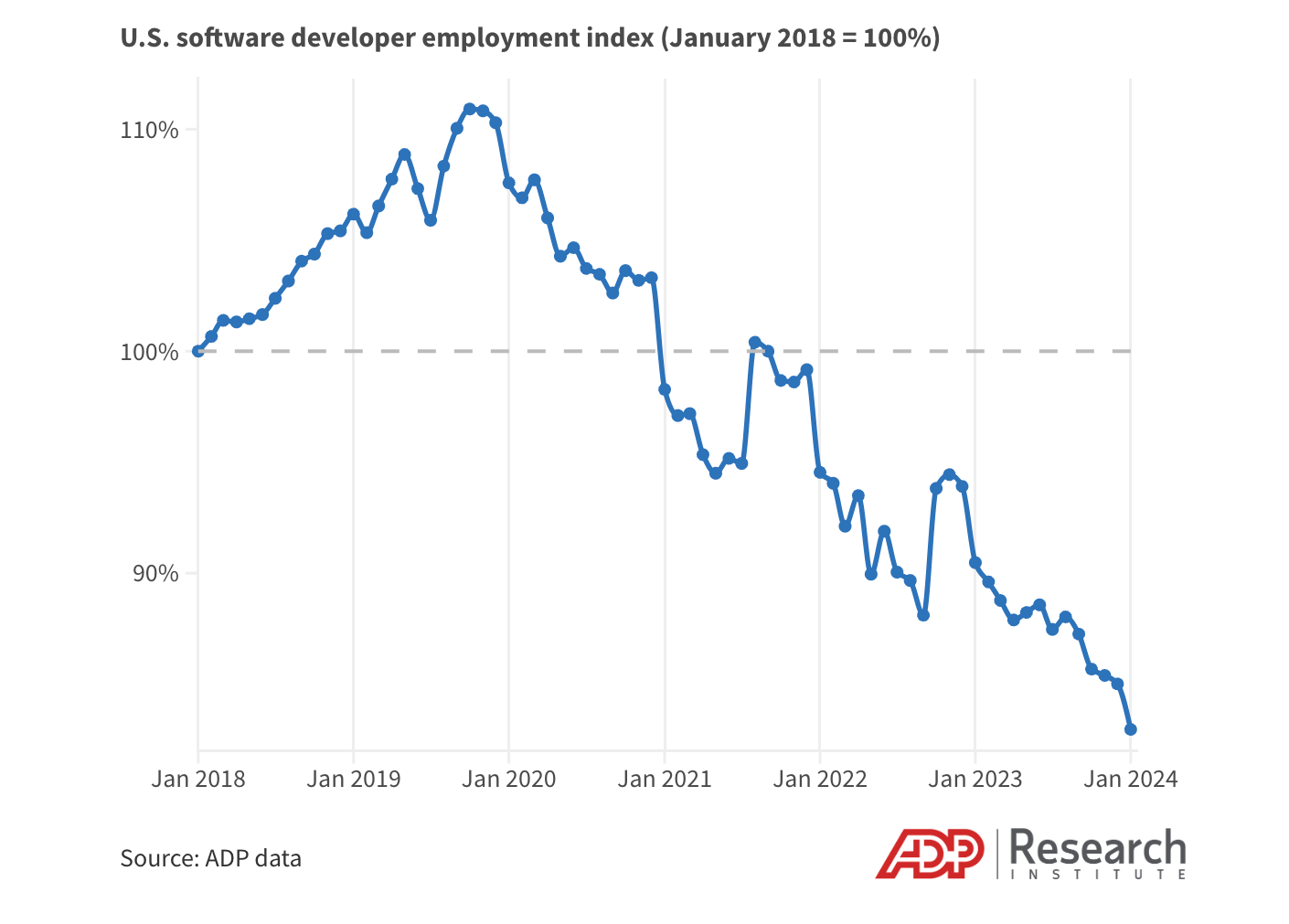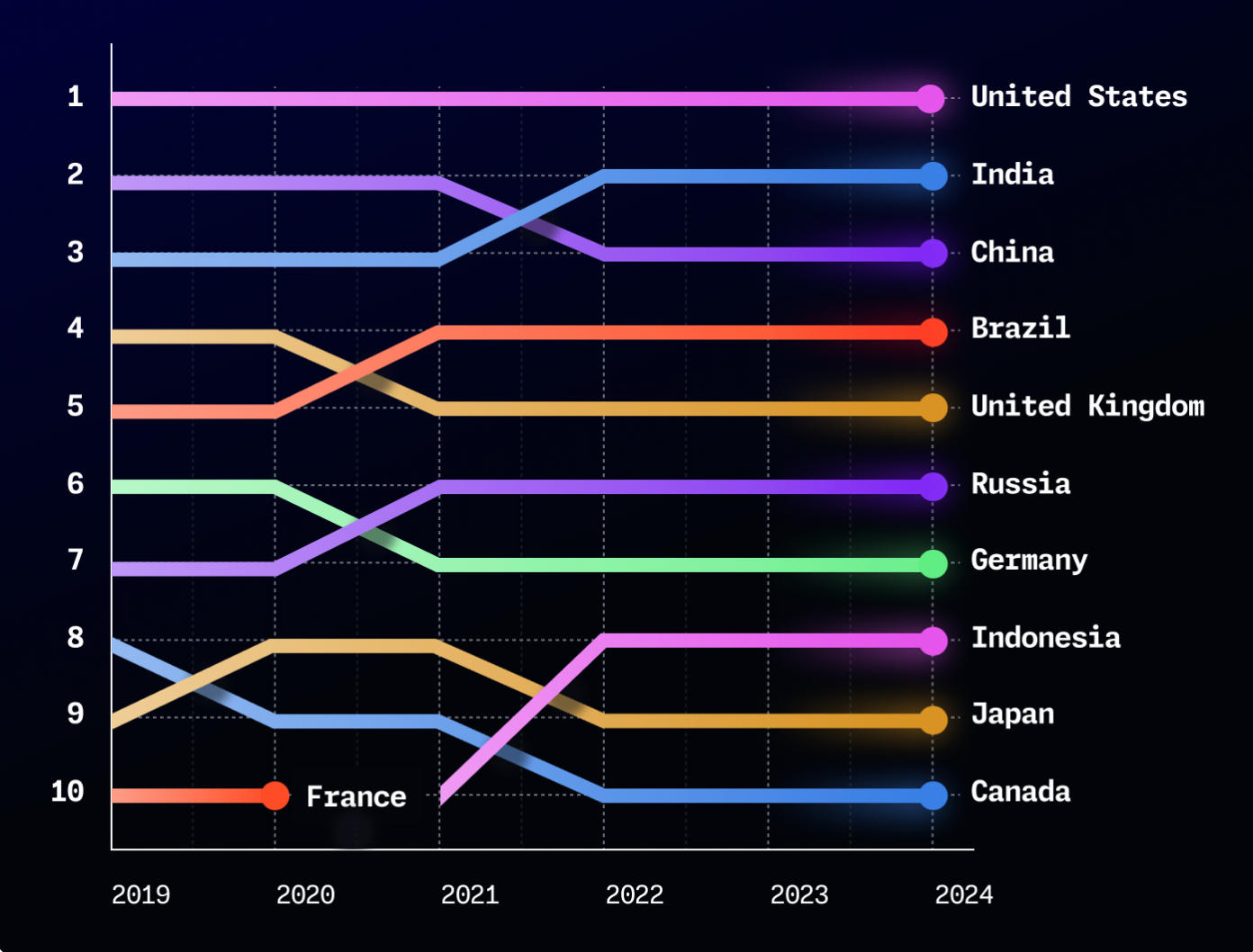Is the AI ‘Doomsday Clock’ ticking for developers? Don’t fear the Reaper

Need an upbeat song about the future? Github’s Octoverse report suggests AI might not be so “grim” after all. At least for now.
“All our times have come… Here, but now they're gone…”
I don’t think the boys of Blue Öyster Cult were crooning about AI and the fate of developers back in '76. Then again, the album featuring the band’s most popular hit was titled Agents of Fortune.
Like… AI agents? A tad prescient, perhaps? Maybe this calls for a little more cowbell:
Despite its “grim” lyrical manifesto, (Don’t Fear) The Reaper is a head-bobbing, toe-tapping tune that lives atop the classic rock pantheon. And while it was penned well before the advent of modern digital technology, the song itself – a dark dichotomy of life and death – seems to align with the reality developers face in this new age of AI.
When I speak of reality, it’s a sobering one. Just last month, Sundar Pichai, CEO of Google, disclosed that more than 25% of the company's internal source code is now generated by artificial intelligence – and in his words, that's only the beginning. It’s a breathtaking revelation from the company innovating its own Gemini AI models, and it offers a glimpse into the future of software development.
Under the covers, there’s even more at play. The search giant is effectively reshaping its entire approach to coding, and its AI strategy is revolutionizing not only how code is written, but the entire development process itself.
This is just one example where AI is already having a palpable impact on the developer ecosystem. For app developers building software, AI is serving as a sort of “partner” on the ride. In the content management and DXP verticals, where web development is an essential part of the journey for agencies and their customers, we see an equitable amount of blocking and tackling across the AI landscape.
People are still making things. But let’s face it: everything we do as builders is being optimized by algorithms, and it's proving more successful in some places than others. While platforms like Squarespace and Wix offer a completely automated experience for generating a website using AI, we can all agree that the results still aren’t optimal. Yet.
Is that the sound of the secondhand ticking on the “Doomsday Clock”? Are we two minutes to midnight from the coming AI apocalypse? Will the code slingers survive the fallout?
Let’s take a quick look at some AI trends, both good and bad – and why GitHub’s recent Octoverse report might be giving the Reaper a run for his money.
Tick, tock…
Despite all the negative commentary surrounding AI and the future of developers – and there is plenty – the market signals are mixed. Contrary to the headlines, humans are still vital to the program. For example, Google stands firmly in its resolve that developers are always in the loop, something I spoke to Casper Rasmussen about in our recent predictions for MACH in 2025.
As a testament to this, Google’s AI-generated code is subject to thorough human review before pushing to production. And by significantly reducing the time and effort needed to generate source code, Google’s engineers are being reallocated or refocused on more creative or challenging tasks.
More time and greater productivity. That’s been the general theme when thwarting the negative sentiment around the future of AI and development.
Case in point: Right now, almost every engineer is reliant on tools like GitHub Copilot to improve the quality of their code and accelerate the adoption of new frameworks. They’re using these resources to offset the burden of mundane tasks like bug fixes, or even to generate entire code blocks – saving precious time and reducing errors.
It all sounds… well, worthy of a little more cowbell.
Don’t fear the reaper, right?
At the same time, the anxiety felt by many developers is real. According to an employment study from ADP that was published in June, developer jobs peaked in 2019 and have been precipitously declining ever since. The study doesn’t draw a straight line to AI as the catalyst, but it does suggest that the ensuing automation could be a contributing factor.

Developer employment peaked in 2019 and has been declining since. Source: ADP
At the same time, prognosticators have long mused about AI's impact on development. One example is a study published in 2017 by the U.S. Department of Energy's Oak Ridge National Laboratory on the subject of ML and computing heterogeneity. The authors predicted that by 2040, machine learning and NLP technologies will write software faster and better than any human – and this was before the advent of modern GenAI technologies.
Then there’s the question of developer skills. We’ve long been postulating that AI will democratize software and application development, making it possible for almost anyone – including less experienced coders or even low-code/no-code users – to build software and applications with AI. What once took scores of developers to create, deploy, manage, and remove bottlenecks is effectively being done at unthinkable levels with a fraction of the human capital.
The net benefits are clear: Enterprises can go to market faster than ever, and startups and small businesses can compete more effectively. This is, by all accounts, a huge advantage – but one that could deprecate the need for basic coding skills.
Data can be tricky to read (hence the need for data scientists). As I said, there are real trends at play that might continue to impact opportunities for developers, and the anxiety is tangible. But there’s mounting evidence that might suggest that the march of the “Doomsday Clock” is slowing – and those gains are coming from some notable places.
Here but now they’re gone? Not on GitHub’s watch
You’ve heard the mantra: AI won’t replace you, but someone who knows how to use AI will.
If there’s one big silver lining in the latest GitHub Octoverse report, it’s that AI isn’t deprecating developers at all – it’s empowering them. And while there are a plethora of articles and sources on the interwebs that have casually made a similar claim, there’s no higher code authority than the “Repo of all Repos."
Here’s why the data matters. Since the advent of GitHub Copilot in 2023, the number of developers on its platform has exploded, reflecting over 5.2 billion contributions to more than 518 million open source, public, and private projects. In many cases, these projects are integrating AI models and capabilities, suggesting these newcomers have been ignited by the rise in artificial intelligence technologies.
GitHub uncovered three big trends that are worth highlighting. First, there’s been a remarkable surge in global generative AI activity. While the U.S. still leads the way, there was a 59% uptick in the number of contributions to GenAI projects on GitHub and a 98% increase in the number of overall projects from across the globe. Wow.
The aforementioned growth in the number of developers worldwide is stunning, but where the growth is coming from is its own story. Here’s a snapshot of where things stand from a community perspective, based on the overall geographies:

Top 10 developers communities on GitHub from 2019-2024. Source: GitHub Octoverse 2024
One of the biggest regions is India, chiming in with 108 million new repos in 2024. The country is expected to represent the biggest developer population on GitHub by 2028 – a fitting achievement for the world’s largest democracy.
There were also large-scale increases in their GitHub Education program, where Copilot has become an essential tool for helping students learn how to write code faster and more efficiently – attracting more people to enter the developer field.
Not to get too technical, but it’s also notable that Python has graduated to become the most used language on GitHub. This is important because it underscores the focus and attention on AI, as Python is heavily relied upon across machine learning, data science, and even hobbyist verticals within the developer ecosystem.
The shift to a Python preference also reinforces a growing cache of attention on open source projects within STEM fields. This is logical, as many participants in this academic realm are motivated by the tenets of the open software development community – where projects are transparent and contributions further the democratization of software.
While GitHub admits that they can’t fully attribute all of the gains to AI, there’s clearly smoke from the generative fire. Some of the most profound increases have emerged from AI projects like ollama, an open source app that allows users to run, create, and share LLMs locally on their own computers.
ollama appeared in the top ten public and open source projects with the most contributions, making it one of the fastest-growing projects this year. More importantly, it reflects heightened demand and interest among developers in AI models that require less computational power.
With any brand-generated survey or report, there’s always a question of bias. Developers are GitHub’s stock and trade, and painting a rosier picture of the future would align with their mission to drive greater adoption.
But the numbers speak for themselves, and it’s clear that as AI accelerates, developers aren’t being sidelined – they’re diving in headfirst. Across GitHub, they’re weaving AI into applications and taking on AI-centric projects like never before. As is evidenced by the metrics, the communities are growing, with unprecedented numbers of developers joining the platform from every corner of the world. Even if it’s not all due to AI, the rise in interest is a net positive.
Take my hand and bridge the AI skills gap
The implicit anxiety around AI goes way back. A 2018 report from Hiring Lab shows how even in those halcyon days, there was mounting fear that AI would replace jobs in specific sectors. In the same data, the study reveals how demand in key areas was growing at a steady clip, particularly in fields like data science.
It’s true that the momentum has cooled since the pandemic, aligning with the drop in developer jobs. That said, during the massive tech layoffs in 2023, data scientists felt less of an impact, particularly those with skills in AI and Python.
This all leads back to the dreaded “Doomsday Clock” and what we can do – at the very least – to slow it down. AI advancements will almost certainly displace more developers up and down the stack, but bridging the skills gap is the best way to stave off this shift in market dynamics while ensuring that we have more of the right kinds of coders at the helm.
As the GitHub Octoverse report codifies, the next wave of developers is already leveraging its Copilot as a go-to partner for ensuring quality, spotting errors, and even generating wholesale code. It’s not fully capable of doing the whole job, but the interplay between user and tool is clearly impacting speed and efficiency. Developers – from full stack to web frontend builders – should continue to invest in learning and growing their knowledge as AI capabilities emerge.
At the same time, as users adopt these new AI-powered coding tools, quality has been a central issue. A survey conducted by CodeSignal suggests that while a majority of developers are using AI-powered coding assistants, 55% of engineers said that they had concerns about the quality of the AI-generated code. That leaves a lot of ground to make up. There are also concerns about managing the technical debt as AI-generated code scales rapidly.
There are also growing concerns about the safety of generated code. According to an IT Pro report, developers are keen on the productivity gains associated with AI tools, but 39% are deeply concerned about the security and safety of AI-generated code. Along with a schism of unreliable results, AI tools can introduce vulnerabilities or critical errors, and the specter of a security issue is one big reason why skilled humans are still in the loop.
We’ll be able to fly with AI
(Don’t Fear) The Reaper is iconic and widely revered. Just ask Will Ferrell. It easily makes Rolling Stone’s list of the top 500 greatest songs ever and continues to find airplay on terrestrial radios across the globe.
If you listen closely, there's a message in this song about the inevitability of death, but also about the fruitlessness of worrying about it. In many ways, it’s a perfect mirror for the widespread concerns of an AI summer/winter that might very well come to pass – and how history demonstrates time and again that humans persevere during these tipping points.
The decrease in developer jobs is a quantifiable phenomenon that continues to create doubt and concern. At the same time, the stark increase in the GitHub developer community provides some real hope that these talented creators will find new opportunities in an evolving ecosystem – and prove that AI is more ally than adversary.
The fact is, we need more developers who are ready for AI. We need highly skilled practitioners who are tacitly focused on problem-solving, algorithm design, and creativity. AI is here to help in that pursuit, assuming the burden of repetitive tasks and streamlining workflows – but not as a replacement for ingenuity.
As we consider the impacts on the CMS and DXP ecosystem, where highly customized websites and omnichannel applications are becoming the norm, it’s important to remember how critical humans are to the experience layer. Creativity and innovation are where people shine, and while AI can churn out ideas based on existing patterns, it lacks the human touch – the intuition and imagination that are essential for innovative solutions.
What also sets developers apart from artificial intelligence is their ability to understand the bigger picture. They don’t just code; they collaborate – often in open source communities. It takes real people to work with stakeholders, assemble the right requirements, and align solutions with real-world business objectives.
While AI excels at processing data and spotting things people can’t see, it’s our human capacity to interpret complex contexts, pivot with changing requirements, and make nuanced decisions that ensure what we develop can deliver real value.
Come on, baby. Take my hand. And ring that AI cowbell.
Upcoming Events

CMS Kickoff 2025
January 14-15, 2025 – St. Petersburg, Florida
Meet industry leaders at our third annual CMS Kickoff – the industry's premier global CMS event. Similar to a traditional kickoff, we reflect on recent trends and share stories from the frontlines. Additionally, we will delve into the current happenings and shed light on the future. Prepare for an unparalleled in-person CMS conference experience that will equip you to move things forward. This is an exclusive event – space is limited, so secure your tickets today.

CMS Summit 25
May 13-14, 2025 – Frankfurt, Germany
Don't miss the first European edition of our prestigious international conference dedicated to the global content management community! CMS Summit 25 will bring together top-notch speakers, our renowned learning format, and engaging social events. Hear from leading practitioners like Deutsche Bahn, Dr. Oetker, and more – and join customers, agencies, and CMS vendors as we discuss current trends and what's ahead for the content and digital experience fields. Connect and network at the only vendor-neutral, in-person conference focused on CMS. Space is limited for this exclusive event, so book your seats today.
